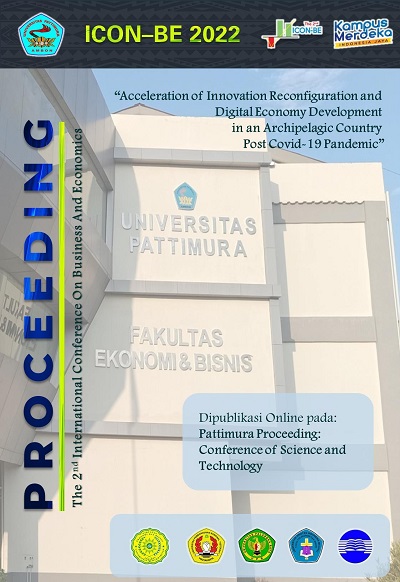RESOURCES AND CAPABILITIES OF FISHERMEN IN AMBON: WHAT LEADS TO COMPETITIVE ADVANTAGE?
Abstract
Introduction/main objectives: One of sectors massively contributing in the economy of Ambon city is fishery and marine. Nevertheless, fishermen, who have important roles in the business of catching and marketing fishes in markets, relatively live in poverty despite their daily efforts. This study aims to investigate how fishermen utilize resources and capabilities to sail. Background Problems: enormous fish demands in Ambon city should be the point of advantages for fishermen. Further, these requests are because the main consumption of the people of Ambon city is fish. Novelty: This research pictures fishermen lives through economic aspects widely to guideline in exploiting the benefits of fish sales. This situation encourages researchers to find out how fishermen achieve competitive excellence in their businesses. Research Methods: this study employs mixed method approaches through questionnaires, intensive interviews, and observation towards fishermen in the villages of Eri, Air Louw, Latuhalat, and Seri. Data were analyzed with SPSS 17. Findings/Results: Study findings indicate that resources and capability of fishermen significantly influence their competitiveness. The greater their competences are, the higher the selling rates are, and within a long term their eagerness will develop. Conclusion: the more excellent resources used in sailing are, the better fishermen’s keenness is. The more their capabilities are, the higher marketing rates are, and within long period of time their ambitions will improve. Small profits are induced by insufficient fishing tools and equipment used compared with fishermen from different regions. Moreover, poor bargaining position of fishermen compared with bidders in markets eliminates their controls to determine market selling prices. The implication is local government must organize policy focusing on increasing fishermen’s resources and capabilities. Furthermore, regulations are required to fix fish values in open markets to give controls to fishermen. In long term, fishers do not only focus on consumption needs but also on allocation of savings and investments
Downloads
References
Barney, J. (2001). Year Retrospective on the Resource-Based View. Journal of Management, 27(2001), 643–650. https://doi.org/10.1177/014920630102700602
Gonzalez-U., Juanita, & Leatherbee, M. (2018). The Effects of Business Accelerators on Venture Performance: Evidence from Start-Up Chile. Review of Financial Studies, 31(4), 1566–1603. https://doi.org/10.1093/rfs/hhx103
Grant, R.M. (1991). The Resource-Based Theory of Competitive Advantage: Implications for Strategy Formulation. California Management Review, 33(3), 114–135. https://doi.org/10.2307/41166664
Lockett, A., Thompson, S., & Morgenstern, U. (2009). The Development of the Resource-Based View of the Firm: A Critical Appraisal. International Journal of Management Reviews, 11(1), 9–28. https://doi.org/10.1111/j.1468-2370.2008.00252.x
Maheswara, A.A.N.G., Setiawina, N.D., & Saskara, I.A.N. (2016). Analisis Faktor-Faktor Yang Mempengaruhi Pendapatan UKM Sektor Perdagangan di Kota Denpasar. E-Jurnal Ekonomi dan Bisnis Universitas Udayana, 5(12), 4271–98.
Metekohy, S. (2020). Determinan Pendapatan Nelayan di Pulau Ambon. Cita Ekonomika Jurnal Ekonomi, 14(1), 1–10. https://doi.org/10.51125/citaekonomika.v14i1.2618
Prasetyo, T., & Harjanti, D. (2013). Modal Sosial Pengusaha Mikro dan Kecil Sektor Informal dan Hubungannya dengan Kinerja Bisnis di Wilayah Jawa Timur. Agora, 1(3), 1–4.
Purwaningsih, R., & Kusuma, P. (2015). Analisis Faktor-Faktor yang Mempengaruhi Kinerja Usaha Kecil dan Menengah (UKM) dengan Metode Structural Equation Modeling (Studi Kasus UKM Berbasis Industri Kreatif Kota Semarang). Pp. 17–22 in Prosiding Seminar Sains Nasional dan Teknologi ke-6.
Samosir, M.S., Utama, M.S., & Marhaeni. A.A.I.N. (2016). Analisis Pengaruh Pemberdayaan dan Kinerja UMKM Terhadap Kesejahteraan Pelaku UMKM di Kabupaten Sikka-NTT. E-Jurnal Ekonomi dan Bisnis Universitas Udayana, 5, 1359–1384.
Sandra, A., & Purwanto, E. (2015). Pengaruh Faktor-Faktor Eksternal dan Internal terhadap Kinerja Usaha Kecil dan Menengah di Jakarta. Business Management, 11(1), 97–124. https://doi.org/
10.30813/bmj.v11i1.623
Schenkel, M.T., D’Souza R.R., & Matthews C.H. (2012). Entrepreneurial Capital: Examining Linkages in Human and Social Capital of New Ventures. Journal of Developmental Entrepreneurship, 17(2), 1–26. https://doi.org/10.1142/S1084946712500094
Tuhuteru, A., Kusumastanto, T., & Hidayat, A. (2015). Kebijakan Pengelolaan Sumberdaya Ikan Pelagis Besar di Kota Ambon. Risalah Kebijakan Pertanian Dan Lingkungan: Rumusan Kajian Strategis Bidang Pertanian dan Lingkungan, 2(3), 181–190. https://doi.org/10.20957/jkebijakan.v2i3.12573
Wauran, P.C. (2012). Strategi Pemberdayaan Sektor Informal Perkotaan di Kota Manado. Jurnal Pembangunan Ekonomi dan Keuangan Daerah, 7(3), 1–30.
Wu, I.L., & Chen J.L. (2014). Knowledge Management Driven Firm Performance: The Roles of Business Process Capabilities and Organizational Learning. Journal of Knowledge Management, 18(6), 1141–1164. https://doi.org/10.1108/JKM-05-2014-0192
Copyright (c) 2023 Pattimura Proceeding: Conference of Science and Technology

This work is licensed under a Creative Commons Attribution-NonCommercial-ShareAlike 4.0 International License.












